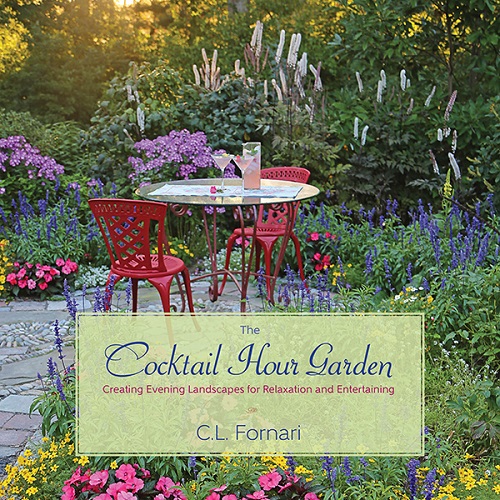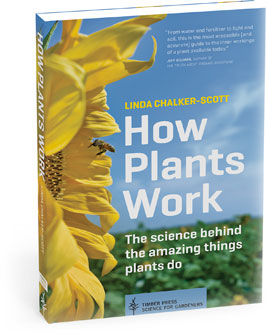July 17, 2016 – The Science of Plants; the Magic of Cocktail Hours
Today I welcome two impressive and outspoken horticulturists to The Mike Nowak Show. In fact, I don’t know whether to welcome them with open arms or to head for the hills while I still have a chance. Well, I’m the one who invited them to be on the program, so I will stick around and try to keep my head above water.
Those two people are Dr. Linda Chalker-Scott from Washington State University and author C. L. Fornari, who is also known The Garden Lady. Both are fond of busting gardening myths and of speaking their minds, which is where my insecurities kick in.
The Cocktail Hour Garden, or, a reason to drink outdoors
I introduce them in order of their appearance on the show this morning. I got to know C. L. Fornari last year, when I was wandering in the Intertubes wilderness. One of the very first interviews I did from my dining room table was with Fornari, who in 2014 had published an excellent book called Coffee for Roses: …and 70 Other Misleading Myths About Backyard Gardening. Coffee for Roses is also the name of a blog that is penned by Fornari.
This year (and how she finds time to write all of this stuff is beyond me) she is out with a book called The Cocktail Hour Garden: Creating Landscapes for Relaxation and Entertaining. In this book, the Cocktail Hour is both metaphor and reality. As Fornari writes:
When staged outdoors in a natural environment, the cocktail hour is more  than a transition from the workday into the dinner hour. It is the time to mark a shift from human pursuits and general business to a period where we acknowledge and appreciate our connectedness to the world around us. For most people, their daily work is indoors and cut off from nature. The cocktail hour garden functions to gently shift our focus to the greater world where we live and the wonder of the plants that sustain all life.
than a transition from the workday into the dinner hour. It is the time to mark a shift from human pursuits and general business to a period where we acknowledge and appreciate our connectedness to the world around us. For most people, their daily work is indoors and cut off from nature. The cocktail hour garden functions to gently shift our focus to the greater world where we live and the wonder of the plants that sustain all life.
One of Fornari’s goals is to get us as gardeners to appreciate the multiple facets of plants and their surroundings, including touch, fragrance, illumination, sound, motion, color, taste and the sense of well-being that they can engender.
She covers a lot of ground, so to speak: advice about choosing plants (of course), architecture, furniture selection, how to attract wildlife, the benefits of adding vegetables and herbs to your landscape, and how to prepare a few beverages and snacks to make the time in your piece of paradise even more enjoyable.
It’s a lovely book with lovely photos and it’s probably going to give you more than a couple of gardening or landscaping ideas that had never occurred to you before.
How Plants Work…and how some universities don’t
Linda Chalker-Scott has been on my program at each of my different venues–Gargantua Radio and Progresso Radio, and now on Que 4 Radio.
She has a Ph.D. in Horticulture from Oregon State University and is an ISA-certified arborist. She is Washington State University’s extension urban horticulturist (a source of controversy that I’ll get to in a moment) and an associate professor in the Department of Horticulture. She is the author of several books, including another myth-busting as well as award-winning work, The Informed Gardener.
She is also one of the founding members of The Garden Professors Blog, which has some of the most interesting and frustrating gardening conversations to be found on the Interwebs. If you go there, be prepared to bring your science!
Now she has written How Plants Work: The science behind the amazing things plants do. Who knew that anthocyanins could be so interesting! Not to mention mitochondria, chloroplasts, lignin, cutin, suberin, carotenoids, phytohormones, photorespiration…should I quit now?
My point is that if you have any interest in the science of how and why plants grow, this book is for you. Considering the necessary dive into complex physiological processes that you might not have even thought of before, Dr. Chalker-Scott writes in a very accessible way, and her enthusiasm for her subject is infectious.
And when I say “accessible,” I mean she knows what the average gardener does out there. And she’s armed with facts:
I know a lot of you enjoy your power tools and handling a rototiller is almost as fun as riding a bucking bronco. But as far as life in the soil is concerned, this is the equivalent of an underground tsunami. Rototilling  destroys natural soil structure along with any plant roots and hapless animals in the path of destruction. Soils are more than just a medium for growing veggies: they are complex ecosystems containing beneficial bacteria, fungi, insects, nematodes, earthworms, and many other denizens. Well-structured soils, along with their natural living communities of organisms, benefit plant roots and enhance their establishment. Roots damaged by rototilling require energy and resources to repair, and when their protective outer tissues are torn they are exposed to diseases and pests.
destroys natural soil structure along with any plant roots and hapless animals in the path of destruction. Soils are more than just a medium for growing veggies: they are complex ecosystems containing beneficial bacteria, fungi, insects, nematodes, earthworms, and many other denizens. Well-structured soils, along with their natural living communities of organisms, benefit plant roots and enhance their establishment. Roots damaged by rototilling require energy and resources to repair, and when their protective outer tissues are torn they are exposed to diseases and pests.
You go girl!
But the purpose of the book isn’t to smack you over the head with a rolled up newspaper. It’s really to introduce you to a world of biology that will have you saying, “So that’s why that happens!” For instance, the science behind why tree leaves turn color in the fall is connected to why some leaves leaf out red and then turn to green. (Those darned anthocyanins again!)
And you probably have the mistaken impression that when plants experience cold weather, they die because their cells freeze and explode. And you would be wrong.
If more gardeners read more books like this, they would have fewer questions and healthier gardens. Get yourself a copy.
Which takes us to my earlier comment about Washington State University, where Linda Chalker-Scott “develops educational materials for home gardeners, certified arborists, restoration ecologists, pesticide applicators, and the nursery and landscape industry.”
In short (because I can’t possibly cover this whole mess in a few paragraphs) WSU is waging war against Dr. Chalker-Scott, seeking to dismiss her for “incompetence.”
I first found out about this issue in an article written by Susan Harris in Garden Rant. Harris described it as a “witch hunt,” writing, “Linda is doing and has done more to further the mission of Extension (providing accurate gardening information to the public) than any other Extension person in the U.S. – no contest! That’s in addition to work at the state and campus level that we don’t hear about.”
Jeff Gillman, who is the Director of the Botanical Gardens at the University of North Carolina at Charlotte.and one of “The Garden Professors,” writes on their blog:
I have had the opportunity to read the investigative report…. And it’s damning.
I mean, you know, if you call 29 pages of rumors, accusations, and the author repeatedly pointing out that Linda isn’t doing a job that she wasn’t hired to do damning.
You can read the report too – it’s over on Facebook. It’s a closed group so you need to get there through this link
https://www.facebook.com/groups/SupportLCS/
Just ask to join.
So regarding this letter — I call BS (meaning Bad Stuff).
I have two major problems with it. First, the report is packed with unsubstantiated “facts” intended to create bias against Linda, and second, it’s an attack on you.
That’s right. This attack on Linda is a direct attack on you. At this point in time there is no University based extension professional doing a better job of transferring science-based information to the general public.
Period.
Linda’s appointment is 100% extension. That means that 100% of her time should be devoted to transferring research based information to you, the public. Well guess how she spends her time? She’s giving you what you, the taxpayer, are paying for. The investigators are saying she should do more experimental work – something she is not paid to do.
If you want to read the very latest, here is a recent letter from WSU Vice Provost Erica Weintraub Austin and the the response from Dr. Chalker-Scott.
All in all, it is a very ugly affair and does not reflect well on Washington State University. If you want to understand the on-going war in academia over science and funding, you should read this interview with Virginia Tech Professor Marc Edwards in Chronicle of Higher Education.
Edwards is the person who blew the lid off of the Flint, Michigan lead poisoning story. Here, he basically says that public science is broken. He describes his own battle to serve the public, which has cost him money, career and even friends. I’m not saying that this is exactly what’s going on with Linda Chalker-Scott, but it does not bode well for the future of learning in America.
